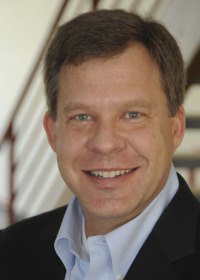Led by Mark Mondry, executive in Residence for the Division of Economics and Business, the ETM lecture series are seminars designed to help professionals achieve success in an increasingly global economy. Last week was the second seminar in the series, “The Value of Networking, Social Media, and Professional Organizations.”
Mondry began by going over the ‘Flight Plan.’ The metaphor of flight helps to illustrate the importance of making sure that sufficient thought goes into actions and that professional decisions are not taken lightly. The Flight Plan’s parts include the systems check, remembering the importance of innovation as well as collaboration, in-flight, influence through social media, professional associations and networking and how to use it, and the landing, your plan and how you are going to use it.
Mondry’s definition of innovation is clear, “The ability of individuals, companies, and entire nations to continuously create their desired future.” He then summed up the idea of innovation in one simple statement, “This is your job. You must seek to ‘create your futures,’ or you would not be at Mines. This is why we seek out particular career paths. Once we have chosen them, however, the innovation is our job. At times we will not, however, be able to bring innovation on our own.” Next, Mondry shifted the conversation to the importance of leadership while maintaining the importance of collaboration.
Mondry explained, “A good leader realizes that different styles are tools in their tool-chest. A good leader can adopt different styles for different situations and a good leader can switch from one minute to the next. But, is it about being ‘liked?’” When this question was presented to the audience, the overwhelming majority said, “Yes.” The consensus was that those who were liked have greater perceived power. A debate ensued when a second question was posed, “Is it better to be liked, or to be respected?” The dominating consensus, when given these two choices, was that is is better to be respected. Mondry explained that there are three factors that determine influence which are what you know, what you are good at, and who you know.
Those that are respected can be counted on and are preceived as being trustworthy, an important factor in perceived power. Mondry followed this statement with an important point, “Don’t take it upon yourself to have all the right answers.” Respect can come from not always knowing the answer, but knowing how to find it.
After this, the discussion turned to social media. According to surveys, 57% of US workers use social media for business purposes at least once per week. The number one reason given for this was “to gain knowledge or ask questions of a community.” This is integral to the concept of knowing how to find the right answer. One such resource for this is LinkedIn.com. According to Mondry, LinkedIn has become a hub for professionals in all industries and has filled a niche in the social media world allowing people to use it for resumes, recruiting, preparing for interviews, and researching potential candidates.
Mondry warns that, in the increasingly technological world, the internet can say more about an individual than what can be gleaned in-person “Social media is a looking glass into who you are.” Some related statistics:
- 35% of hiring managers immediately screened out candidates based on what they found on networking sites.
- Only 18% of hiring managers say that they were encouraged to hire a candidate due to their online presence.
Despite the advent of new electronic social networks, Mondry was quick to point out the continuing importance of professional organizations. While it is no longer difficult to be visible to interested parties through the internet, getting interest from parties can be a much more challenging task. Professional organizations are an amazing tool available to solve this problem, and are extremely powerful in the world of networking. Some still view networking within organizations as a daunting world of shaking hands and “cold-calling” professionals, but Mondry reminds us, “You are always networking!”
While constantly being judged by a network could seem less than ideal, it is essential to the importance of opportunity in the business world. Mondry finished the talk by reminding the audience, “What you share, both online and off, and what you don’t share can can make a statement about you. Make sure that statement is a good one.”



'Making a statement through social media' has no comments
Be the first to comment this post!